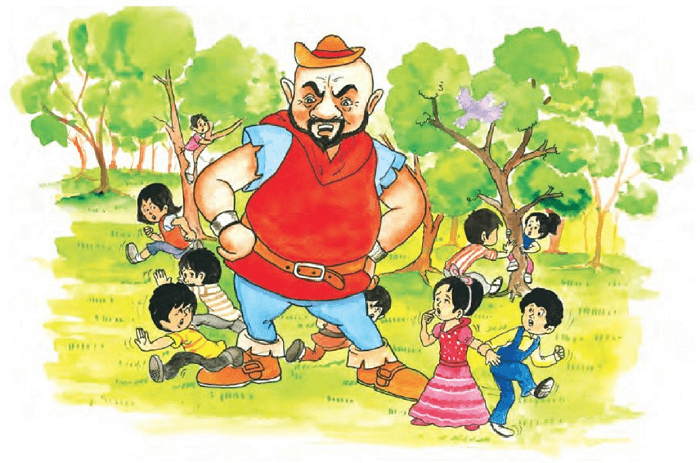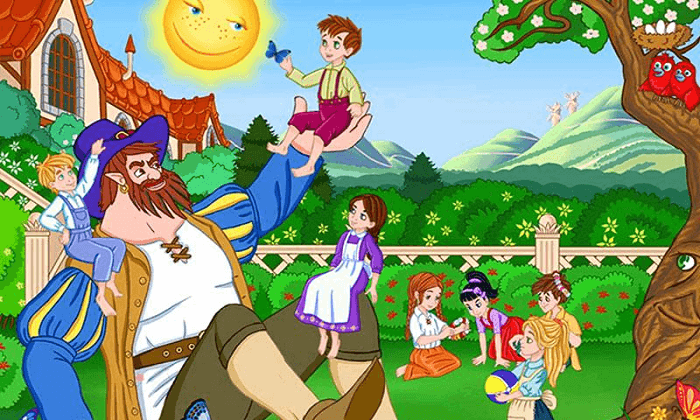The Selfish Giant Summary Class 8 EnglishIntroductionThe background for 'The Selfish Giant' is a giant's garden. When the selfish Giant stops the children from playing in his garden, the garden becomes frosty white. In his garden, Spring never arrives. Oscar Wilde's narrative touches on humility, salvation, compassion, kindness, and love. The Giant is portrayed as extremely selfish and wicked at the beginning. His happiness at seeing the tiny kid alters him. When the Giant became emotionless and disheartening towards the children, everything around him became cold and depressing. He became happier when he had a warm heart, and everything around him also became happier. The story demonstrates the benefits of sharing. Not only does the Giant make the children happy, but he also assures them that he will enter Heaven via his acts of charity. The Plot of the StoryNeighborhood kids play in the Giant's garden every day after school. They have access to fresh food, lovely flowers, delightfully singing birds, and a pleasant open place for play. However, their happy pastime is short-lived when the Giant, who has been abroad for seven years, returns and sends the kids away after discovering strangers in his garden. Selfishly, he announces that the only person who should play in his garden is himself, and he imposes this with a high brick wall surrounding his property. He has a sign on this wall that says, "TRESPASSERS WILL BE PROSECUTED." 
The kids try playing on the street instead, but it doesn't work. They spend their days simply relaxing on the walls and are always drawn to the garden where they used to play. They wish they could travel back in time. Meanwhile, the Giant is unhappy because his land is in perpetual Winter. Because of the Giant's self-centeredness, Spring, Summer, and Autumn completely abandon the garden and let the powers of Winter convert it into their play area. Snow, Frost, North Wind, and Hail cause havoc all over the Giant's land, upsetting his calm and leaving his garden undeveloped all year. The Giant is awakened by a linnet singing outside his window after nearly a year of this awful Winter. He glances out the window to discover that the children have returned to the garden after sneaking in through a hole in the wall. They brought Spring with them, and the garden is once again flourishing. The Giant, moved by this sight, recognizes his foolishness and tries to make apologies to the children. He notices a miserable small child crying in the farthest area of the garden after failing to climb the tree there. The child's suffering is so profound that Winter remains in that tiny garden section. The Giant approaches, innocently sending the other children away since they still fear him, and sets that kid on the tree's upper branches. The tree flowers all over as soon as he does this, and the young kid kisses the Giant tenderly. The other youngsters are overjoyed when they realize the Giant no longer intends to hurt them and return to the garden. The Giant tears down the wall surrounding his garden, and his land is now available to the neighboring kids. Every day after school, the kids go to their new friend's garden to play for hours. Over time, the Giant values the children far more than anything he owns, including his garden. He has profited from their relationship, and in his old age, nothing gives him more joy than sitting in his recliner and watching them play. But he never forgets what happened to his first little friend, the boy who embraced and kissed him. This youngster was never seen again. The Giant ultimately gets his answer when he meets the boy again beneath the tree in his garden one morning-the youngster is no older than before, and the tree has been changed into gold and silver. Nails had pierced the boy's hands and feet, and the Giant recognized after a brief confusion that this was no ordinary kid but the Christ kid. Christ praises the Giant for his charity years ago and the precious life he's led since. As a reward, he invites him to paradise. The children uncover the Giant's body beneath the tree that afternoon, covered in white blooms. Character Summary
The selfish Giant has a garden where local children play while he is on an extended vacation. At the start of the narrative, the Giant is greedy and hardhearted; when he discovers children in his garden, he chases them out and constructs a high wall to keep them out. Due to the Giant's selfishness, Spring, Summer, and Fall all quit the garden, leaving just the forces of Winter-the North Wind, Snow, Frost, and Hail-to occupy it all year. For months after that, the Giant is depressed, unable to comprehend why Spring has not arrived. Spring returns to the garden only when the kids sneak inside to play. The Giant softened after spending months without warmth and happiness, recognizes that he imposed the Winter on himself by selfishness, and instantly seeks to apologize. His first act of charity is to a small child wailing in the yard's far corner because he can't climb the tree there. The Giant lifts the boy into the tree, immediately bursting into bloom as the youngster hugs and kisses the Giant. The Giant warms the rest of the youngsters to him with this deed, and he blows down the wall to share his garden with them forever. The Giant's heart softens even more in the years that follow as he matures, beginning to value the children far more than the garden and wishing to see the young child who kissed him, whom he adores the most. The Giant's wish is fulfilled only when he is old and weak; the child appears in the garden's corner, transfigured, and reveals himself as the Christ Child. In return for his kindness, he then invites the Giant into paradise. This redemption arc-from self-centered sinner to selfless neighbor-reaches its zenith in an eternal paradise and exemplifies the Christian promise of salvation. This moral message is meant to be conveyed as simply and directly as possible through the Giant's persona.
The children in the narrative are neighborhood kids who play in the Giant's garden after school. They are liked by the birds, the trees, and even the seasons since they are innocent and pure. Spring, Summer, and Fall provide excellent weather and pleasure to the children's playing, participating in their joy. When the Giant returns home from a long vacation and ruthlessly forces the children out of his garden, the warmer seasons follow, leaving only Winter to dwell in the Giant's land all year. Only when the children sneak through a breach in the wall does Winter melt into Spring, allowing the youngsters to enjoy the garden once more. This entire sequence-Autumn into Winter, Winter into Spring, all following the children's movements-testifies to the children's intrinsic ability to modify the environment around them just by their innocence. They improve not only the landscape but also the Giant himself. The Giant's heart melts at the sight of their reinvigorated pleasure, and he sees the mistake of his actions. He immediately begins working to make apologies. The children run away from him as he approaches, but his first act of kindness-lifting a young kid into a tree he had been trying to climb-quickly wins their trust. According to Wilde, small children are remarkably connected to a person's true nature and can hence easily forgive the Giant. The kids continue to play in the Giant's garden when he breaks the wall enclosing it. In terms of structure, the children provide the foundation for the Giant's redemption; they create an environment that prompts him to change, and their happiness indicates the Giant's moral development. The narrative concludes with the children enjoying a peaceful relationship with their giant neighbor, demonstrating that he has genuinely forgiven himself. 
The tiny kid in the narrative is Christ veiled, who takes this character to give the Giant a chance at salvation. The Christ Child initially emerges among the countless youngsters who, incognito in the crowd, slip back inside the Giant's garden via the hole in the wall. He stands out not for his divine nature, which he hides, but rather because he is the only child not taking advantage of the springtime. Because he is too young to climb the nearby tree, he hides in the farthest corner of the garden, where the winter weather continues. The Giant, eager to make one for his cruelty, lifts the youngster onto the tree, which immediately bursts into blossom as the child caresses his newfound friend. This is how the Giant shows his kindness to the children, and it begins with his reformation-which occurs, unknown to the Giant, according to Christ's magnificent purpose. The notion that all-powerful creatures put humanity to the test by pretending themselves as ordinary mortals is as old as the Greek tale of Baucis and Philemon, an elderly couple who inadvertently entertain the deity Zeus for supper. It emphasizes the Christian notion that a person's behavior towards their neighbor, particularly children and the impoverished, indicates their moral status. At the end of the story, the Christ Child reveals his true identity-the Crucifixion wounds appear on his hands and feet, and the tree he once attempted to climb, symbolizing the cross, is transfigured in gold and silver demonstrating to the Giant that his generosity to the children has redeemed his soul. He then welcomes the Giant into Paradise.
The seasons are personified as Spring, summer, and autumn. They bless the Giant's garden with excellent weather at the beginning of the story-until he evicts the children from his garden, at which point they flee, appalled by the Giant's selfishness. The disfavor of the seasons demonstrates that the Giant's selfish activities are against the natural order and hence deserve retribution from above.
The personifications of Winter include Snow, Frost, North Wind, and Hail. They have lived in the Giant's garden since Spring, Summer, and Autumn (along with the children) have fled, enabling an infinitely long Winter to take their place. Though the Snow, Frost, Hail, and North Wind have no ill will towards the Giant, they enjoy wreaking havoc on his property and making him miserable. This is the Giant's deserved punishment for being selfish and keeping his garden to himself, demonstrating that sin has natural repercussions for the culprit. SummaryEvery afternoon after school, the kids play in the Giant's Garden, their favorite neighborhood hangout. The garden is large and lush, full of peach trees, lovely flowers, and songbirds, and it makes the children extremely happy. |
 For Videos Join Our Youtube Channel: Join Now
For Videos Join Our Youtube Channel: Join Now
Feedback
- Send your Feedback to [email protected]
Help Others, Please Share









